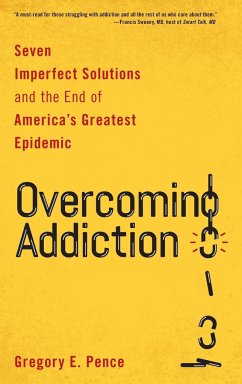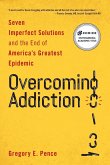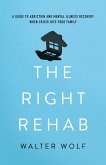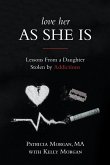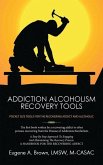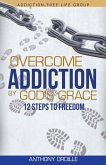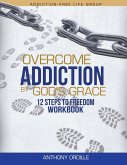Gregory E. Pence
Overcoming Addiction
Seven Imperfect Solutions and the End of America's Greatest Epidemic
Gregory E. Pence
Overcoming Addiction
Seven Imperfect Solutions and the End of America's Greatest Epidemic
- Gebundenes Buch
- Merkliste
- Auf die Merkliste
- Bewerten Bewerten
- Teilen
- Produkt teilen
- Produkterinnerung
- Produkterinnerung
Leading bioethicist Gregory Pence demystifies seven foundational theories of addiction to reveal how they must work together to build more comprehensive solutions. Concerned citizens, individuals suffering from addiction, their families, and those who devote their lives to fighting addiction will find this new perspective a hopeful call to arms.
Andere Kunden interessierten sich auch für
![Overcoming Addiction Overcoming Addiction]() Gregory E. PenceOvercoming Addiction28,99 €
Gregory E. PenceOvercoming Addiction28,99 €![The Right Rehab The Right Rehab]() Walter WolfThe Right Rehab41,99 €
Walter WolfThe Right Rehab41,99 €![Love Her As She Is Love Her As She Is]() Patricia MorganLove Her As She Is20,99 €
Patricia MorganLove Her As She Is20,99 €![Her Family Tree Her Family Tree]() Marcia B HornHer Family Tree16,99 €
Marcia B HornHer Family Tree16,99 €![Addiction Alcoholism Recovery Tools Addiction Alcoholism Recovery Tools]() Eugene BrownAddiction Alcoholism Recovery Tools20,99 €
Eugene BrownAddiction Alcoholism Recovery Tools20,99 €![Overcome Addiction by God's Grace Overcome Addiction by God's Grace]() Anthony OrdilleOvercome Addiction by God's Grace15,99 €
Anthony OrdilleOvercome Addiction by God's Grace15,99 €![Overcome Addiction by God's Grace Overcome Addiction by God's Grace]() Anthony OrdilleOvercome Addiction by God's Grace10,99 €
Anthony OrdilleOvercome Addiction by God's Grace10,99 €-
-
-
Leading bioethicist Gregory Pence demystifies seven foundational theories of addiction to reveal how they must work together to build more comprehensive solutions. Concerned citizens, individuals suffering from addiction, their families, and those who devote their lives to fighting addiction will find this new perspective a hopeful call to arms.
Hinweis: Dieser Artikel kann nur an eine deutsche Lieferadresse ausgeliefert werden.
Hinweis: Dieser Artikel kann nur an eine deutsche Lieferadresse ausgeliefert werden.
Produktdetails
- Produktdetails
- Verlag: Rowman & Littlefield Publishers
- Seitenzahl: 208
- Erscheinungstermin: 19. Februar 2020
- Englisch
- Abmessung: 235mm x 157mm x 17mm
- Gewicht: 496g
- ISBN-13: 9781538135037
- ISBN-10: 1538135035
- Artikelnr.: 58024636
- Herstellerkennzeichnung
- Libri GmbH
- Europaallee 1
- 36244 Bad Hersfeld
- gpsr@libri.de
- Verlag: Rowman & Littlefield Publishers
- Seitenzahl: 208
- Erscheinungstermin: 19. Februar 2020
- Englisch
- Abmessung: 235mm x 157mm x 17mm
- Gewicht: 496g
- ISBN-13: 9781538135037
- ISBN-10: 1538135035
- Artikelnr.: 58024636
- Herstellerkennzeichnung
- Libri GmbH
- Europaallee 1
- 36244 Bad Hersfeld
- gpsr@libri.de
By Gregory E. Pence
Preface Chapter 1Our Epidemic of Alcoholism and Addiction Chapter
2Philosophical Issues in Theories of Alcoholism/Addiction Chapter 3A Mental
Disease: The Theory of Alcoholics/Narcotics Anonymous Chapter 4A Brain
Disease: The Neuroscience Theory Chapter 5Bad Choices: The Kantian Theory
Chapter 6Lesser of the Evils: The Theory of Harm Reduction Chapter 7Written
in the DNA: The Genetics Theory Chapter 8Just like My Father: The Model of
Learning Theory Chapter 9A Product of the Times: The Structuralist Theory
Chapter 10Conclusions and Further Inquiry Preface Almost every day,
newspapers or television describe deaths from overdoses. Educated people
understand that addiction and alcoholism raise some of the most pressing
questions of our times: what causes them, how should they best be treated,
how much is the alcoholic or addicted person responsible for his or her
condition, and can victims actually overcome these diseases? What people
don't realize is that these questions not only raise factual issues but
also deeply philosophical ones. In 2016, Surgeon General, Vivek Murthy, MD,
in an essay in the New England Journal of Medicine decried "American's
escalating opioid epidemic."[i] He wrote that, "more than 2 million people
in the United States are addicted to prescription opioids," and that "we
estimate that more than 1 million people who need treatment lack access to
it." Some would call our situation in America a pandemic of addiction and
of abuse of alcohol. Some scholars estimate that 1 American family in 3
suffers personal experience with addition or severe alcoholism. At the same
time as the number of deaths grows each year from overdoses, various
clinics and therapists claim to know the true cause of addiction and the
way to cure it. They write books, start residential treatment centers, and
charge substantial fees. Starting with Alcoholics Anonymous in 1935 and
ending with insights from brain imaging in the last decade, families and
addicts hear conflicting claims about addiction and how to treat it. In all
this noise, it may surprise people that real understanding addiction may be
as much a philosophical problem as a scientific one, that we really need to
understand the foundational commitments of researchers and counselors. Just
hearing one scientist pitch her views, without comment from other views,
dooms listeners to an incomplete understanding. Getting to the bottom of
addiction, and its twin, alcoholism, requires both philosophical acumen and
hard-nosed facts. Getting to the bottom also requires exposing the many
hidden ethical issues in competing claims about treating addiction, such as
how Google can make $187 every time someone clicks on one of its ads for a
a rehab center. Take one recent theoretical battle over treating addiction.
A bitter, sustained debate occurred in 2018 in the normally boring New
England Journal of Medicine. One famous physician- researcher claimed that
addiction was an "acquired disease of the brain" and should be treated as
such. An opposing researcher awhile later opposed that claim, arguing that
addiction was learned behavior that could not be treated solely as a
disease-of-the-brain. In turn, both thought the approach of Alcoholics
Anonymous/Narcotics Anonymous, was simplistic and outdated. And in turn
again, all these theories thought Kant's view of addiction and alcoholism,
as a series of free choices for which people are responsible, was wrong and
primitive (although many ordinary people and parents agreed with Kant.) Not
understanding the philosophical conflict behind conflicting theories dooms
each researcher, each family, to falsely believing that their approach is
true view, while seeing other approaches as besot with ignorance or
bigotry, just as many Christians, Muslims, Hindus or Jews believe that they
grew up in the true religion and, sorry!, but all other religions are
false. Each addiction specialist believes that he or she has discovered the
true theory for treating alcoholism and addictions, but unlike theories of
human nature defended by long-dead philosophers-these living specialists
push their theories with take-no-prisoners zeal. The ferociousness of this
debate will surprise readers, but sadly, it is an ongoing fact. Indeed, as
a physician or PhD writing a book about alcoholism or addiction, it seems a
prerequisite that one be recovering from one of these conditions (Paul
Thomas, Leslie Jamison, Ann Johnston, Annie Grace, Judy Griesel, Marc
Lewis, Maia Szalawitz, et al.) Yet the same passion that these writers
bring to their subject narrows their focus to the theory that worked for
them instead of the broader focus on what might work for other, different
people. And that's important. If addiction and alcoholism are not
all-or-nothing conditions, but spectrums, and if different people arrive at
the same place on these spectrums for different reasons, then a one-sized
approach won't fit all. Tolerance of other views and impartiality are rare
virtues. In the author's reading about alcoholism and addiction over
decades, he has never come across a writer who admits, "Every one of the
other theories contains some truth." Instead, each writer vilifies the
other approaches, accusing them of ignorance, greed, and lack of evidence.
This book discusses the seven leading theories of addiction:
Alcoholics/Narcotics Anonymous, Neuroscience, Kant, Genetics, Learning
Theory, Harm Reduction, and Structuralism. An introductory chapter sketches
the history and nature of our epidemic of substance abuse, while another
gives an overview of theorizing about alcoholism and addiction. The latter
discusses how theories might be usefully compared and evaluated. Seven core
chapters, each covering one theory, follow the two introductory chapters.
As the book progresses, each theory is subjected to criticisms by other
theories. A concluding chapter offers some conclusions and suggests avenues
of further inquiry. This book also emphasizes practical applications of the
theories, empirical tie-ins, and actual cases. Every chapter on a theory
also contains a summary of the theory's explanation of addiction, its
proposed cure or treatment, its explanation of why other theories are
mistaken, its view of money matters, its view of whether addicts are
responsible for their behavior and, its advice for families of affected
relatives. Although much has been written about addiction and although
billions of dollars fund research into treating addiction, many physicians
and educated laymen do not realize how much the definition of addiction, as
well as its treatment, stems from underlying philosophical assumptions.
Ignorance about these assumptions contributes to our ongoing controversies
about treating addiction and our ongoing villainization of opposing views.
As Socrates said, the first step to wisdom is understanding what you don't
know, as well as questioning whether your unstated assumptions are correct.
Moreover, one of the most famous issues in the history of philosophy has
been free will, paralleled by its companion issues of personal
responsibility and blame. Addiction makes resolution of such issues a
national crisis, especially for families of those affected by chronic
users, who are often told they should not blame their son because he has a
medical disease. Yet hardly any philosopher discusses the free will or
responsibility of the addict. The business of treating addiction is a
lucrative one. Two of my former students, both psychiatrists, run groups
every weeknight for addicted dentists, nurses, anesthesiologists, surgeons,
and others. Each night, each person must provide a urine sample and $100
bill (no insurance taken). Each person must do so to retain the right to
continue employment in their practice or hospital. The Surgeon General
noted that "the Mental Health Parity and Addiction Equality Act of 2008 was
a major step forward in ensuring that health insurance plans treat
substance use disorders the same way they treat other medical conditions
... ." It also unleased billions of dollars of insurance money for treating
addiction, setting off scads of problems. This book also follows the money
in discussing many ethical issues surrounding reimbursing those who treat
addiction. Prestigious groups, such as the editorial board of the New York
Times and Surgeon General Vivek Murthy, push for more funding for treatment
of addiction.[ii] But how are we know which treatment to fund without a
thorough understanding of the strengths and weaknesses of different
theories? Should we fund theories whose therapists refuse to submit their
results to impartial observers? Whose counselors cannot provide objective
evidence of success? If we throw gobs of money at scammers, won't we just
waste it? Some last personal remarks: I realize that some families, upon
reading this book, may realize that the money they've spent for a relative
in rehab may have been wasted. If so, I apologize for their hurt feelings.
It is also possible that reading this book may save other families from
wasting money on methods that don't fit their child. I have no monetary or
personal stake in any theory described in this book. Also, I donate a
portion of the royalties from this book to evidence-based treatments of
alcoholism and addiction. I also realize that some recovering alcoholics
and some people recovering from addiction may be inflamed by my description
of a theory that has worked for them. If a particular theory such as
Alcoholics Anonymous has worked for someone, he or she often generalizes it
to be the only theory that can work for everyone. Such people may not
believe that other theories can work for others or that some people
recovered on their own, without accepting any over-arching theory. Again, I
apologize if you think I've short-changed your favorite theory or not done
it justice. The literature and studies of alcoholism and addiction are
vast, encompassing dozens and dozens of journals in many different fields.
I do not claim to have read or mastered all these studies: I do not see how
anyone could. But I do claim to know about the theoretical orientations
that emerge from this literature and how those theories often conflict with
each other. In reading the many memoirs and books of recovering alcoholics
and people with addictions, I get the sense sometimes that these authors
feel that only one who has experienced these syndromes is qualified to
write about them. If you haven't "walked the walk," they imply you can't
credibly "talk the talk." I understand those feelings and I do not want to
take anything away from the many authors who've courageously recovered and
written about their journey to recovery. At the same time, an impartial
observer can be valuable and add understanding to the issues. Because each
profession seems to compete to be the Master of Addiction Treatment,
counselors and writers from each theory only write from their orientation.
Ideally, relatives and people affected need an impartial survey of all the
theories and their strengths and weaknesses. In that way, everyone can
decide which theory, or which combination of theories, works best for him,
her, or their child. [i] Vivek Murthy, "Ending the Opioid Epidemic - A Call
to Action," New England Journal of Medicine, December 22, 2016, 375: 25,
pp. 2413-2415. [ii] Vivek Murthy, "Ending the Opioid Epidemic - A Call to
Action," New England Journal of Medicine, December 22, 2016, 375: 25, pp.
2413-2415; "Breaking America's Opioid Addiction," Editorial, New York
Times, October 1, p. SR8.
2Philosophical Issues in Theories of Alcoholism/Addiction Chapter 3A Mental
Disease: The Theory of Alcoholics/Narcotics Anonymous Chapter 4A Brain
Disease: The Neuroscience Theory Chapter 5Bad Choices: The Kantian Theory
Chapter 6Lesser of the Evils: The Theory of Harm Reduction Chapter 7Written
in the DNA: The Genetics Theory Chapter 8Just like My Father: The Model of
Learning Theory Chapter 9A Product of the Times: The Structuralist Theory
Chapter 10Conclusions and Further Inquiry Preface Almost every day,
newspapers or television describe deaths from overdoses. Educated people
understand that addiction and alcoholism raise some of the most pressing
questions of our times: what causes them, how should they best be treated,
how much is the alcoholic or addicted person responsible for his or her
condition, and can victims actually overcome these diseases? What people
don't realize is that these questions not only raise factual issues but
also deeply philosophical ones. In 2016, Surgeon General, Vivek Murthy, MD,
in an essay in the New England Journal of Medicine decried "American's
escalating opioid epidemic."[i] He wrote that, "more than 2 million people
in the United States are addicted to prescription opioids," and that "we
estimate that more than 1 million people who need treatment lack access to
it." Some would call our situation in America a pandemic of addiction and
of abuse of alcohol. Some scholars estimate that 1 American family in 3
suffers personal experience with addition or severe alcoholism. At the same
time as the number of deaths grows each year from overdoses, various
clinics and therapists claim to know the true cause of addiction and the
way to cure it. They write books, start residential treatment centers, and
charge substantial fees. Starting with Alcoholics Anonymous in 1935 and
ending with insights from brain imaging in the last decade, families and
addicts hear conflicting claims about addiction and how to treat it. In all
this noise, it may surprise people that real understanding addiction may be
as much a philosophical problem as a scientific one, that we really need to
understand the foundational commitments of researchers and counselors. Just
hearing one scientist pitch her views, without comment from other views,
dooms listeners to an incomplete understanding. Getting to the bottom of
addiction, and its twin, alcoholism, requires both philosophical acumen and
hard-nosed facts. Getting to the bottom also requires exposing the many
hidden ethical issues in competing claims about treating addiction, such as
how Google can make $187 every time someone clicks on one of its ads for a
a rehab center. Take one recent theoretical battle over treating addiction.
A bitter, sustained debate occurred in 2018 in the normally boring New
England Journal of Medicine. One famous physician- researcher claimed that
addiction was an "acquired disease of the brain" and should be treated as
such. An opposing researcher awhile later opposed that claim, arguing that
addiction was learned behavior that could not be treated solely as a
disease-of-the-brain. In turn, both thought the approach of Alcoholics
Anonymous/Narcotics Anonymous, was simplistic and outdated. And in turn
again, all these theories thought Kant's view of addiction and alcoholism,
as a series of free choices for which people are responsible, was wrong and
primitive (although many ordinary people and parents agreed with Kant.) Not
understanding the philosophical conflict behind conflicting theories dooms
each researcher, each family, to falsely believing that their approach is
true view, while seeing other approaches as besot with ignorance or
bigotry, just as many Christians, Muslims, Hindus or Jews believe that they
grew up in the true religion and, sorry!, but all other religions are
false. Each addiction specialist believes that he or she has discovered the
true theory for treating alcoholism and addictions, but unlike theories of
human nature defended by long-dead philosophers-these living specialists
push their theories with take-no-prisoners zeal. The ferociousness of this
debate will surprise readers, but sadly, it is an ongoing fact. Indeed, as
a physician or PhD writing a book about alcoholism or addiction, it seems a
prerequisite that one be recovering from one of these conditions (Paul
Thomas, Leslie Jamison, Ann Johnston, Annie Grace, Judy Griesel, Marc
Lewis, Maia Szalawitz, et al.) Yet the same passion that these writers
bring to their subject narrows their focus to the theory that worked for
them instead of the broader focus on what might work for other, different
people. And that's important. If addiction and alcoholism are not
all-or-nothing conditions, but spectrums, and if different people arrive at
the same place on these spectrums for different reasons, then a one-sized
approach won't fit all. Tolerance of other views and impartiality are rare
virtues. In the author's reading about alcoholism and addiction over
decades, he has never come across a writer who admits, "Every one of the
other theories contains some truth." Instead, each writer vilifies the
other approaches, accusing them of ignorance, greed, and lack of evidence.
This book discusses the seven leading theories of addiction:
Alcoholics/Narcotics Anonymous, Neuroscience, Kant, Genetics, Learning
Theory, Harm Reduction, and Structuralism. An introductory chapter sketches
the history and nature of our epidemic of substance abuse, while another
gives an overview of theorizing about alcoholism and addiction. The latter
discusses how theories might be usefully compared and evaluated. Seven core
chapters, each covering one theory, follow the two introductory chapters.
As the book progresses, each theory is subjected to criticisms by other
theories. A concluding chapter offers some conclusions and suggests avenues
of further inquiry. This book also emphasizes practical applications of the
theories, empirical tie-ins, and actual cases. Every chapter on a theory
also contains a summary of the theory's explanation of addiction, its
proposed cure or treatment, its explanation of why other theories are
mistaken, its view of money matters, its view of whether addicts are
responsible for their behavior and, its advice for families of affected
relatives. Although much has been written about addiction and although
billions of dollars fund research into treating addiction, many physicians
and educated laymen do not realize how much the definition of addiction, as
well as its treatment, stems from underlying philosophical assumptions.
Ignorance about these assumptions contributes to our ongoing controversies
about treating addiction and our ongoing villainization of opposing views.
As Socrates said, the first step to wisdom is understanding what you don't
know, as well as questioning whether your unstated assumptions are correct.
Moreover, one of the most famous issues in the history of philosophy has
been free will, paralleled by its companion issues of personal
responsibility and blame. Addiction makes resolution of such issues a
national crisis, especially for families of those affected by chronic
users, who are often told they should not blame their son because he has a
medical disease. Yet hardly any philosopher discusses the free will or
responsibility of the addict. The business of treating addiction is a
lucrative one. Two of my former students, both psychiatrists, run groups
every weeknight for addicted dentists, nurses, anesthesiologists, surgeons,
and others. Each night, each person must provide a urine sample and $100
bill (no insurance taken). Each person must do so to retain the right to
continue employment in their practice or hospital. The Surgeon General
noted that "the Mental Health Parity and Addiction Equality Act of 2008 was
a major step forward in ensuring that health insurance plans treat
substance use disorders the same way they treat other medical conditions
... ." It also unleased billions of dollars of insurance money for treating
addiction, setting off scads of problems. This book also follows the money
in discussing many ethical issues surrounding reimbursing those who treat
addiction. Prestigious groups, such as the editorial board of the New York
Times and Surgeon General Vivek Murthy, push for more funding for treatment
of addiction.[ii] But how are we know which treatment to fund without a
thorough understanding of the strengths and weaknesses of different
theories? Should we fund theories whose therapists refuse to submit their
results to impartial observers? Whose counselors cannot provide objective
evidence of success? If we throw gobs of money at scammers, won't we just
waste it? Some last personal remarks: I realize that some families, upon
reading this book, may realize that the money they've spent for a relative
in rehab may have been wasted. If so, I apologize for their hurt feelings.
It is also possible that reading this book may save other families from
wasting money on methods that don't fit their child. I have no monetary or
personal stake in any theory described in this book. Also, I donate a
portion of the royalties from this book to evidence-based treatments of
alcoholism and addiction. I also realize that some recovering alcoholics
and some people recovering from addiction may be inflamed by my description
of a theory that has worked for them. If a particular theory such as
Alcoholics Anonymous has worked for someone, he or she often generalizes it
to be the only theory that can work for everyone. Such people may not
believe that other theories can work for others or that some people
recovered on their own, without accepting any over-arching theory. Again, I
apologize if you think I've short-changed your favorite theory or not done
it justice. The literature and studies of alcoholism and addiction are
vast, encompassing dozens and dozens of journals in many different fields.
I do not claim to have read or mastered all these studies: I do not see how
anyone could. But I do claim to know about the theoretical orientations
that emerge from this literature and how those theories often conflict with
each other. In reading the many memoirs and books of recovering alcoholics
and people with addictions, I get the sense sometimes that these authors
feel that only one who has experienced these syndromes is qualified to
write about them. If you haven't "walked the walk," they imply you can't
credibly "talk the talk." I understand those feelings and I do not want to
take anything away from the many authors who've courageously recovered and
written about their journey to recovery. At the same time, an impartial
observer can be valuable and add understanding to the issues. Because each
profession seems to compete to be the Master of Addiction Treatment,
counselors and writers from each theory only write from their orientation.
Ideally, relatives and people affected need an impartial survey of all the
theories and their strengths and weaknesses. In that way, everyone can
decide which theory, or which combination of theories, works best for him,
her, or their child. [i] Vivek Murthy, "Ending the Opioid Epidemic - A Call
to Action," New England Journal of Medicine, December 22, 2016, 375: 25,
pp. 2413-2415. [ii] Vivek Murthy, "Ending the Opioid Epidemic - A Call to
Action," New England Journal of Medicine, December 22, 2016, 375: 25, pp.
2413-2415; "Breaking America's Opioid Addiction," Editorial, New York
Times, October 1, p. SR8.
Preface Chapter 1Our Epidemic of Alcoholism and Addiction Chapter
2Philosophical Issues in Theories of Alcoholism/Addiction Chapter 3A Mental
Disease: The Theory of Alcoholics/Narcotics Anonymous Chapter 4A Brain
Disease: The Neuroscience Theory Chapter 5Bad Choices: The Kantian Theory
Chapter 6Lesser of the Evils: The Theory of Harm Reduction Chapter 7Written
in the DNA: The Genetics Theory Chapter 8Just like My Father: The Model of
Learning Theory Chapter 9A Product of the Times: The Structuralist Theory
Chapter 10Conclusions and Further Inquiry Preface Almost every day,
newspapers or television describe deaths from overdoses. Educated people
understand that addiction and alcoholism raise some of the most pressing
questions of our times: what causes them, how should they best be treated,
how much is the alcoholic or addicted person responsible for his or her
condition, and can victims actually overcome these diseases? What people
don't realize is that these questions not only raise factual issues but
also deeply philosophical ones. In 2016, Surgeon General, Vivek Murthy, MD,
in an essay in the New England Journal of Medicine decried "American's
escalating opioid epidemic."[i] He wrote that, "more than 2 million people
in the United States are addicted to prescription opioids," and that "we
estimate that more than 1 million people who need treatment lack access to
it." Some would call our situation in America a pandemic of addiction and
of abuse of alcohol. Some scholars estimate that 1 American family in 3
suffers personal experience with addition or severe alcoholism. At the same
time as the number of deaths grows each year from overdoses, various
clinics and therapists claim to know the true cause of addiction and the
way to cure it. They write books, start residential treatment centers, and
charge substantial fees. Starting with Alcoholics Anonymous in 1935 and
ending with insights from brain imaging in the last decade, families and
addicts hear conflicting claims about addiction and how to treat it. In all
this noise, it may surprise people that real understanding addiction may be
as much a philosophical problem as a scientific one, that we really need to
understand the foundational commitments of researchers and counselors. Just
hearing one scientist pitch her views, without comment from other views,
dooms listeners to an incomplete understanding. Getting to the bottom of
addiction, and its twin, alcoholism, requires both philosophical acumen and
hard-nosed facts. Getting to the bottom also requires exposing the many
hidden ethical issues in competing claims about treating addiction, such as
how Google can make $187 every time someone clicks on one of its ads for a
a rehab center. Take one recent theoretical battle over treating addiction.
A bitter, sustained debate occurred in 2018 in the normally boring New
England Journal of Medicine. One famous physician- researcher claimed that
addiction was an "acquired disease of the brain" and should be treated as
such. An opposing researcher awhile later opposed that claim, arguing that
addiction was learned behavior that could not be treated solely as a
disease-of-the-brain. In turn, both thought the approach of Alcoholics
Anonymous/Narcotics Anonymous, was simplistic and outdated. And in turn
again, all these theories thought Kant's view of addiction and alcoholism,
as a series of free choices for which people are responsible, was wrong and
primitive (although many ordinary people and parents agreed with Kant.) Not
understanding the philosophical conflict behind conflicting theories dooms
each researcher, each family, to falsely believing that their approach is
true view, while seeing other approaches as besot with ignorance or
bigotry, just as many Christians, Muslims, Hindus or Jews believe that they
grew up in the true religion and, sorry!, but all other religions are
false. Each addiction specialist believes that he or she has discovered the
true theory for treating alcoholism and addictions, but unlike theories of
human nature defended by long-dead philosophers-these living specialists
push their theories with take-no-prisoners zeal. The ferociousness of this
debate will surprise readers, but sadly, it is an ongoing fact. Indeed, as
a physician or PhD writing a book about alcoholism or addiction, it seems a
prerequisite that one be recovering from one of these conditions (Paul
Thomas, Leslie Jamison, Ann Johnston, Annie Grace, Judy Griesel, Marc
Lewis, Maia Szalawitz, et al.) Yet the same passion that these writers
bring to their subject narrows their focus to the theory that worked for
them instead of the broader focus on what might work for other, different
people. And that's important. If addiction and alcoholism are not
all-or-nothing conditions, but spectrums, and if different people arrive at
the same place on these spectrums for different reasons, then a one-sized
approach won't fit all. Tolerance of other views and impartiality are rare
virtues. In the author's reading about alcoholism and addiction over
decades, he has never come across a writer who admits, "Every one of the
other theories contains some truth." Instead, each writer vilifies the
other approaches, accusing them of ignorance, greed, and lack of evidence.
This book discusses the seven leading theories of addiction:
Alcoholics/Narcotics Anonymous, Neuroscience, Kant, Genetics, Learning
Theory, Harm Reduction, and Structuralism. An introductory chapter sketches
the history and nature of our epidemic of substance abuse, while another
gives an overview of theorizing about alcoholism and addiction. The latter
discusses how theories might be usefully compared and evaluated. Seven core
chapters, each covering one theory, follow the two introductory chapters.
As the book progresses, each theory is subjected to criticisms by other
theories. A concluding chapter offers some conclusions and suggests avenues
of further inquiry. This book also emphasizes practical applications of the
theories, empirical tie-ins, and actual cases. Every chapter on a theory
also contains a summary of the theory's explanation of addiction, its
proposed cure or treatment, its explanation of why other theories are
mistaken, its view of money matters, its view of whether addicts are
responsible for their behavior and, its advice for families of affected
relatives. Although much has been written about addiction and although
billions of dollars fund research into treating addiction, many physicians
and educated laymen do not realize how much the definition of addiction, as
well as its treatment, stems from underlying philosophical assumptions.
Ignorance about these assumptions contributes to our ongoing controversies
about treating addiction and our ongoing villainization of opposing views.
As Socrates said, the first step to wisdom is understanding what you don't
know, as well as questioning whether your unstated assumptions are correct.
Moreover, one of the most famous issues in the history of philosophy has
been free will, paralleled by its companion issues of personal
responsibility and blame. Addiction makes resolution of such issues a
national crisis, especially for families of those affected by chronic
users, who are often told they should not blame their son because he has a
medical disease. Yet hardly any philosopher discusses the free will or
responsibility of the addict. The business of treating addiction is a
lucrative one. Two of my former students, both psychiatrists, run groups
every weeknight for addicted dentists, nurses, anesthesiologists, surgeons,
and others. Each night, each person must provide a urine sample and $100
bill (no insurance taken). Each person must do so to retain the right to
continue employment in their practice or hospital. The Surgeon General
noted that "the Mental Health Parity and Addiction Equality Act of 2008 was
a major step forward in ensuring that health insurance plans treat
substance use disorders the same way they treat other medical conditions
... ." It also unleased billions of dollars of insurance money for treating
addiction, setting off scads of problems. This book also follows the money
in discussing many ethical issues surrounding reimbursing those who treat
addiction. Prestigious groups, such as the editorial board of the New York
Times and Surgeon General Vivek Murthy, push for more funding for treatment
of addiction.[ii] But how are we know which treatment to fund without a
thorough understanding of the strengths and weaknesses of different
theories? Should we fund theories whose therapists refuse to submit their
results to impartial observers? Whose counselors cannot provide objective
evidence of success? If we throw gobs of money at scammers, won't we just
waste it? Some last personal remarks: I realize that some families, upon
reading this book, may realize that the money they've spent for a relative
in rehab may have been wasted. If so, I apologize for their hurt feelings.
It is also possible that reading this book may save other families from
wasting money on methods that don't fit their child. I have no monetary or
personal stake in any theory described in this book. Also, I donate a
portion of the royalties from this book to evidence-based treatments of
alcoholism and addiction. I also realize that some recovering alcoholics
and some people recovering from addiction may be inflamed by my description
of a theory that has worked for them. If a particular theory such as
Alcoholics Anonymous has worked for someone, he or she often generalizes it
to be the only theory that can work for everyone. Such people may not
believe that other theories can work for others or that some people
recovered on their own, without accepting any over-arching theory. Again, I
apologize if you think I've short-changed your favorite theory or not done
it justice. The literature and studies of alcoholism and addiction are
vast, encompassing dozens and dozens of journals in many different fields.
I do not claim to have read or mastered all these studies: I do not see how
anyone could. But I do claim to know about the theoretical orientations
that emerge from this literature and how those theories often conflict with
each other. In reading the many memoirs and books of recovering alcoholics
and people with addictions, I get the sense sometimes that these authors
feel that only one who has experienced these syndromes is qualified to
write about them. If you haven't "walked the walk," they imply you can't
credibly "talk the talk." I understand those feelings and I do not want to
take anything away from the many authors who've courageously recovered and
written about their journey to recovery. At the same time, an impartial
observer can be valuable and add understanding to the issues. Because each
profession seems to compete to be the Master of Addiction Treatment,
counselors and writers from each theory only write from their orientation.
Ideally, relatives and people affected need an impartial survey of all the
theories and their strengths and weaknesses. In that way, everyone can
decide which theory, or which combination of theories, works best for him,
her, or their child. [i] Vivek Murthy, "Ending the Opioid Epidemic - A Call
to Action," New England Journal of Medicine, December 22, 2016, 375: 25,
pp. 2413-2415. [ii] Vivek Murthy, "Ending the Opioid Epidemic - A Call to
Action," New England Journal of Medicine, December 22, 2016, 375: 25, pp.
2413-2415; "Breaking America's Opioid Addiction," Editorial, New York
Times, October 1, p. SR8.
2Philosophical Issues in Theories of Alcoholism/Addiction Chapter 3A Mental
Disease: The Theory of Alcoholics/Narcotics Anonymous Chapter 4A Brain
Disease: The Neuroscience Theory Chapter 5Bad Choices: The Kantian Theory
Chapter 6Lesser of the Evils: The Theory of Harm Reduction Chapter 7Written
in the DNA: The Genetics Theory Chapter 8Just like My Father: The Model of
Learning Theory Chapter 9A Product of the Times: The Structuralist Theory
Chapter 10Conclusions and Further Inquiry Preface Almost every day,
newspapers or television describe deaths from overdoses. Educated people
understand that addiction and alcoholism raise some of the most pressing
questions of our times: what causes them, how should they best be treated,
how much is the alcoholic or addicted person responsible for his or her
condition, and can victims actually overcome these diseases? What people
don't realize is that these questions not only raise factual issues but
also deeply philosophical ones. In 2016, Surgeon General, Vivek Murthy, MD,
in an essay in the New England Journal of Medicine decried "American's
escalating opioid epidemic."[i] He wrote that, "more than 2 million people
in the United States are addicted to prescription opioids," and that "we
estimate that more than 1 million people who need treatment lack access to
it." Some would call our situation in America a pandemic of addiction and
of abuse of alcohol. Some scholars estimate that 1 American family in 3
suffers personal experience with addition or severe alcoholism. At the same
time as the number of deaths grows each year from overdoses, various
clinics and therapists claim to know the true cause of addiction and the
way to cure it. They write books, start residential treatment centers, and
charge substantial fees. Starting with Alcoholics Anonymous in 1935 and
ending with insights from brain imaging in the last decade, families and
addicts hear conflicting claims about addiction and how to treat it. In all
this noise, it may surprise people that real understanding addiction may be
as much a philosophical problem as a scientific one, that we really need to
understand the foundational commitments of researchers and counselors. Just
hearing one scientist pitch her views, without comment from other views,
dooms listeners to an incomplete understanding. Getting to the bottom of
addiction, and its twin, alcoholism, requires both philosophical acumen and
hard-nosed facts. Getting to the bottom also requires exposing the many
hidden ethical issues in competing claims about treating addiction, such as
how Google can make $187 every time someone clicks on one of its ads for a
a rehab center. Take one recent theoretical battle over treating addiction.
A bitter, sustained debate occurred in 2018 in the normally boring New
England Journal of Medicine. One famous physician- researcher claimed that
addiction was an "acquired disease of the brain" and should be treated as
such. An opposing researcher awhile later opposed that claim, arguing that
addiction was learned behavior that could not be treated solely as a
disease-of-the-brain. In turn, both thought the approach of Alcoholics
Anonymous/Narcotics Anonymous, was simplistic and outdated. And in turn
again, all these theories thought Kant's view of addiction and alcoholism,
as a series of free choices for which people are responsible, was wrong and
primitive (although many ordinary people and parents agreed with Kant.) Not
understanding the philosophical conflict behind conflicting theories dooms
each researcher, each family, to falsely believing that their approach is
true view, while seeing other approaches as besot with ignorance or
bigotry, just as many Christians, Muslims, Hindus or Jews believe that they
grew up in the true religion and, sorry!, but all other religions are
false. Each addiction specialist believes that he or she has discovered the
true theory for treating alcoholism and addictions, but unlike theories of
human nature defended by long-dead philosophers-these living specialists
push their theories with take-no-prisoners zeal. The ferociousness of this
debate will surprise readers, but sadly, it is an ongoing fact. Indeed, as
a physician or PhD writing a book about alcoholism or addiction, it seems a
prerequisite that one be recovering from one of these conditions (Paul
Thomas, Leslie Jamison, Ann Johnston, Annie Grace, Judy Griesel, Marc
Lewis, Maia Szalawitz, et al.) Yet the same passion that these writers
bring to their subject narrows their focus to the theory that worked for
them instead of the broader focus on what might work for other, different
people. And that's important. If addiction and alcoholism are not
all-or-nothing conditions, but spectrums, and if different people arrive at
the same place on these spectrums for different reasons, then a one-sized
approach won't fit all. Tolerance of other views and impartiality are rare
virtues. In the author's reading about alcoholism and addiction over
decades, he has never come across a writer who admits, "Every one of the
other theories contains some truth." Instead, each writer vilifies the
other approaches, accusing them of ignorance, greed, and lack of evidence.
This book discusses the seven leading theories of addiction:
Alcoholics/Narcotics Anonymous, Neuroscience, Kant, Genetics, Learning
Theory, Harm Reduction, and Structuralism. An introductory chapter sketches
the history and nature of our epidemic of substance abuse, while another
gives an overview of theorizing about alcoholism and addiction. The latter
discusses how theories might be usefully compared and evaluated. Seven core
chapters, each covering one theory, follow the two introductory chapters.
As the book progresses, each theory is subjected to criticisms by other
theories. A concluding chapter offers some conclusions and suggests avenues
of further inquiry. This book also emphasizes practical applications of the
theories, empirical tie-ins, and actual cases. Every chapter on a theory
also contains a summary of the theory's explanation of addiction, its
proposed cure or treatment, its explanation of why other theories are
mistaken, its view of money matters, its view of whether addicts are
responsible for their behavior and, its advice for families of affected
relatives. Although much has been written about addiction and although
billions of dollars fund research into treating addiction, many physicians
and educated laymen do not realize how much the definition of addiction, as
well as its treatment, stems from underlying philosophical assumptions.
Ignorance about these assumptions contributes to our ongoing controversies
about treating addiction and our ongoing villainization of opposing views.
As Socrates said, the first step to wisdom is understanding what you don't
know, as well as questioning whether your unstated assumptions are correct.
Moreover, one of the most famous issues in the history of philosophy has
been free will, paralleled by its companion issues of personal
responsibility and blame. Addiction makes resolution of such issues a
national crisis, especially for families of those affected by chronic
users, who are often told they should not blame their son because he has a
medical disease. Yet hardly any philosopher discusses the free will or
responsibility of the addict. The business of treating addiction is a
lucrative one. Two of my former students, both psychiatrists, run groups
every weeknight for addicted dentists, nurses, anesthesiologists, surgeons,
and others. Each night, each person must provide a urine sample and $100
bill (no insurance taken). Each person must do so to retain the right to
continue employment in their practice or hospital. The Surgeon General
noted that "the Mental Health Parity and Addiction Equality Act of 2008 was
a major step forward in ensuring that health insurance plans treat
substance use disorders the same way they treat other medical conditions
... ." It also unleased billions of dollars of insurance money for treating
addiction, setting off scads of problems. This book also follows the money
in discussing many ethical issues surrounding reimbursing those who treat
addiction. Prestigious groups, such as the editorial board of the New York
Times and Surgeon General Vivek Murthy, push for more funding for treatment
of addiction.[ii] But how are we know which treatment to fund without a
thorough understanding of the strengths and weaknesses of different
theories? Should we fund theories whose therapists refuse to submit their
results to impartial observers? Whose counselors cannot provide objective
evidence of success? If we throw gobs of money at scammers, won't we just
waste it? Some last personal remarks: I realize that some families, upon
reading this book, may realize that the money they've spent for a relative
in rehab may have been wasted. If so, I apologize for their hurt feelings.
It is also possible that reading this book may save other families from
wasting money on methods that don't fit their child. I have no monetary or
personal stake in any theory described in this book. Also, I donate a
portion of the royalties from this book to evidence-based treatments of
alcoholism and addiction. I also realize that some recovering alcoholics
and some people recovering from addiction may be inflamed by my description
of a theory that has worked for them. If a particular theory such as
Alcoholics Anonymous has worked for someone, he or she often generalizes it
to be the only theory that can work for everyone. Such people may not
believe that other theories can work for others or that some people
recovered on their own, without accepting any over-arching theory. Again, I
apologize if you think I've short-changed your favorite theory or not done
it justice. The literature and studies of alcoholism and addiction are
vast, encompassing dozens and dozens of journals in many different fields.
I do not claim to have read or mastered all these studies: I do not see how
anyone could. But I do claim to know about the theoretical orientations
that emerge from this literature and how those theories often conflict with
each other. In reading the many memoirs and books of recovering alcoholics
and people with addictions, I get the sense sometimes that these authors
feel that only one who has experienced these syndromes is qualified to
write about them. If you haven't "walked the walk," they imply you can't
credibly "talk the talk." I understand those feelings and I do not want to
take anything away from the many authors who've courageously recovered and
written about their journey to recovery. At the same time, an impartial
observer can be valuable and add understanding to the issues. Because each
profession seems to compete to be the Master of Addiction Treatment,
counselors and writers from each theory only write from their orientation.
Ideally, relatives and people affected need an impartial survey of all the
theories and their strengths and weaknesses. In that way, everyone can
decide which theory, or which combination of theories, works best for him,
her, or their child. [i] Vivek Murthy, "Ending the Opioid Epidemic - A Call
to Action," New England Journal of Medicine, December 22, 2016, 375: 25,
pp. 2413-2415. [ii] Vivek Murthy, "Ending the Opioid Epidemic - A Call to
Action," New England Journal of Medicine, December 22, 2016, 375: 25, pp.
2413-2415; "Breaking America's Opioid Addiction," Editorial, New York
Times, October 1, p. SR8.

